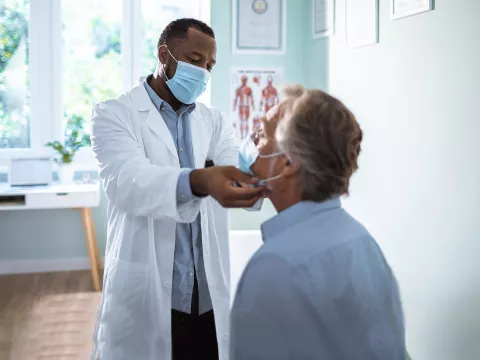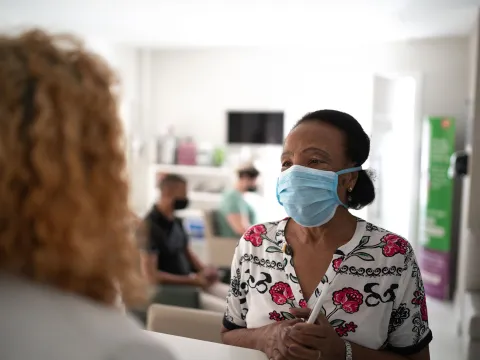- AdventHealth

A new study was recently shared that revealed older people and young black men are most affected by anal cancer. The study, published by the Journal of the National Cancer Institute, found that squamous cell carcinoma of the anus (SCCA) incidence is rising in the United States.
The study revealed that SCCA incidence increased 2.7% per year from 2001 to 2015, with “pronounced increases in age groups 50 years and older.” The cases of anal cancer increased most in instances of these older adults, as well as young black men born circa 1986. To better understand the findings of the study, we spoke to AdventHealth fellowship-trained colon and rectal surgeon Justin Kelly, MD, FRCS.
Dr. Kelly would agree but says it’s difficult to tell from this study. “Perhaps one of the reasons for the disease increase is the greater prevalence of anal dysplasia in HIV,” he said. “That goes in tandem with an increase in human papilloma virus (HPV) amongst that population allied to improved awareness and diagnostics in both patients and treating physicians and the emergence of the Prep (pre-exposure prophylaxis) agents,” he added.
Connection With HPV
“Greater than 90% of anal squamous cell cancers are associated with HPV,” says Dr. Kelly, adding, “Furthermore, HPV, particularly subtypes 16 and 18, are risk factors for the progression of low grade to high grade squamous intraepithelial lesion which is the precursor state of cancer — especially in people who have HIV or males who have unprotected intercourse with males.”
HPV is the most common type of sexually transmitted infection, and while it is usually harmless, it can lead to cancer in some cases. The increase in anal cancer cases for certain age groups could be linked to the introduction of the first HPV vaccine in 2006. Anyone over age 26 at that time would probably not have been offered the vaccine to prevent HPV.
Risk Factors and Prevention
People who are at risk of developing a benign, pre-cancerous form of HPV include anyone who has a compromised immune system — such as a person with HIV, or undergoing chemotherapy or had a solid organ transplant (lung, heart or kidney etc). Others who have an increased risk of HPV include men who have unprotected intercourse with men and women who have had cervical dysplasia. “30% of women who have cervical dysplasia will also have anal dysplasia, so it’s also imperative they get screened for this as well” says Dr. Kelly.
Monitoring any existing cells is very important in preventing those cells from becoming cancerous over time, notes Dr. Kelly: “When you talk about anal dysplasia — the benign, pre-cancerous lesion — we know that it is incredibly important for those patients should enter a surveillance program that includes either high-resolution anoscopy every 612 months or at least regular office based check-ups.”
In a 2018 four-year study of 2,000 patients in Boston, Mass., it was discovered that about 8% of patients with benign anal intraepithelial neoplasia will develop full-blown SCCA. “Of that 8% of people who are diagnosed with invasive cancer, 30% were staged as a T2 lesion or higher, so it’s not insignificant,” says Dr. Kelly.
Treatment Options
If a biopsy confirms SCCA, 80% of patients will be treated completely and cured with chemoradiotherapy, as per Nigro protocol. The remaining patients who get persistent or recurrent disease can now enter cutting edge clinical trials offering novel immunotherapy agents with AdventHealth.
AdventHealth Medical Group Colorectal Surgery has recently established a dedicated Anal Dysplasia Clinic, the first of its’ kind in Central Florida. Here, there is an open-door policy where all patients are welcome and are seen by a specialist. Next day appointments are offered as standard. Most importantly, all diagnostic and treatment options, such as pap smears and high resolution anoscopy, can be completed easily in the office so there is no need for formal general anesthesia. “The clinic is a one-stop shop for patients who are at-risk or have documented precancerous or cancerous cells,” says Dr. Kelly.
According to AdventHealth experts, this is very much a treatable condition and this working group aim to decrease the risk of developing invasive cancers. If you are in the at-risk population as Dr. Kelly described above, visit your physician to learn more about preventing SSCA. Click here to learn more about Dr. Kelly and make an appointment at Central Florida’s only dedicated Anal Dysplasia Clinic.





